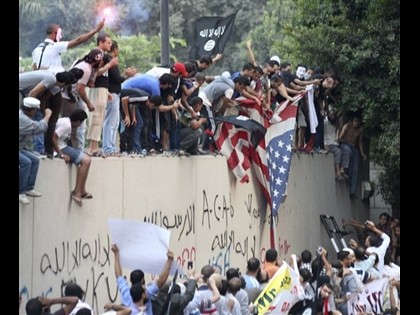In his “drone speech” Thursday, President Barack Obama referred to the oft-cited argument that the U.S. should close the Guantánamo Bay terror detention facility (GTMO) because it stirs anti-American opinion: “GTMO has become a symbol around the world for an America that flouts the rule of law,” he said.
If that was once a reasonable argument, it no longer holds water after the Sep. 11 attack on the U.S. embassy in Cairo.
That assault, which occurred just before the deadly assault on the U.S. consulate in Benghazi, Libya, may have been partly inspired and exacerbated by the infamous YouTube video insulting Islam.
But the main and major grievance was the continued imprisonment of Omar Abdul Rahman, a.k.a. the “Blind Sheikh,” currently serving a life sentence for the 1993 World Trade Center bombing–not in GTMO but in Butner, North Carolina.
To date, while GTMO has been used to recruit terrorists–often in connection with false stories, such as the slanderous Newsweek tale about flushing a Koran down a toilet at the prison–it has not led to assaults on U.S. diplomatic personnel.
The civilian trial and imprisonment of the Blind Sheikh has not only inspired violent demonstrations in Cairo, but also motivated a recent deadly terrorist attack by Al-Qaeda in Algeria.
The fact that our civilian justice system has inspired more direct violence than GTMO should not come as a surprise to those who understand that terrorists target the U.S. because of what we are, not because of what we have done. It is also a powerful argument against moving terrorists detained overseas to the U.S. homeland to face trial in federal court–something that the Obama administration has already started doing this year.
The arguments against trying terror detainees caught overseas in domestic federal courts are well-rehearsed. They create new terror targets at the courthouse and in front of the cameras. They create new security risks when sensitive evidence is shared or key witnesses testify. They grant our enemies protections that our own soldiers do not enjoy. And they struggle to maintain fairness because of government guarantees of conviction.
President Obama, acknowledging some of the evidentiary problems in terror cases, announced Thursday that he wanted GTMO detainees to be put on trial in a new “site in the United States where we can hold military commissions.” It is difficult to take that pledge seriously when for more than four years the Obama administration has done all it could to avoid military commissions in favor of ordinary federal trials.
The president complained about delays in the cases at GTMO: “Imagine a future–10 years from now or 20 years from now–when the United States of America is still holding people who have been charged with no crime on a piece of land that is not part of our country.” Those delays are partly his own doing. And the GTMO prisoners may not have been “charged” but they are not entitled to ordinary presumptions of innocence.
They are unlawful combatants, choosing to operate outside the framework of international law. They still have rights–they can challenge their detention, for instance. But they are not political prisoners.
Islamist radicals understand that, which is why additional grievances like the Koran story are needed to make GTMO useful as a recruiting tool. The real problem for them is not GTMO, but North Carolina, and all that it represents.

COMMENTS
Please let us know if you're having issues with commenting.